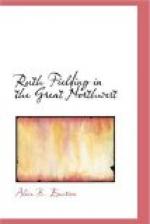“Oh—well!”
“In addition,” said Mr. Hammond briskly, “look what we may make out of the Indian girl. She may coin us a mint of money, Ruth Fielding.”
“Perhaps,” smiled Ruth.
But she was not so eager for money. The thing that fascinated her imagination was the possibility that they might make of Wonota, the Osage maiden, a great and famous movie star. Ruth desired very much to have a part in that work.
She knew, because Mr. Hammond had told her, as well as Wonota herself, that the Osage Indians as a tribe were the wealthiest people under the guardianship of the American Government. Their oil leases were fast bringing the tribe a great fortune. But Wonota, being under age, had no share in this wealth. At this time the income of the tribe was between four and five thousand dollars a day—and the tribe was not large.
“But Wonota can have none of that,” explained the Indian maid. “It is apportioned to the families, and Totantora, the head of my family, is somewhere in that Europe where the war is. I can get no share of the money. It is not allowed.”
So, with the incentive of getting money for her search, Wonota was desirous of pleasing her white friends in every particular. Besides, ambition had budded in the girl’s heart. She wanted to be a screen actress.
“If your ‘Brighteyes,’ Miss Fielding, is ever shown at Three Rivers Station or Pawhuska, where the Agency is, I know every member of the tribe will go to see the film. When some of the young men of our tribe acted in a round-up picture when I was a little girl, even the old men and great-grandmothers traveled a hundred miles to see the film run off. It was like an exodus, for some of them were two days and nights on the way”
“The Osage Indians are not behind the times, then?” laughed Ruth. “They are movie fans?”
“They realize that their own day has departed. The buffalo and elk have gone. Even the prairie chickens are seen but seldom. Almost no game is found upon our plains, and not much back in the hills. Many of our young men till the soil. Some have been to the Carlisle School and have taken up professions or are teachers. The Osage people are no longer warlike. But some of our young men volunteered for this white man’s war.”
“I know that,” sad Ruth warmly. “I saw some of them over there in France—at least, some Indian volunteers. Captain Cameron worked in the Intelligence Service with some of them. That is the spy service, you know. The Indians were just as good scouts in France and Belgium as they were on their own plains.”
“We are always the same. It is only white men who change,” declared Wonota with confidence. “The redman is never two-faced or two-tongued.”
“Well,” grumbled Jennie, afterward, “what answer was there to make to that? She has her own opinion of Lo, the poor Indian, and it would be impossible to shake it.”




